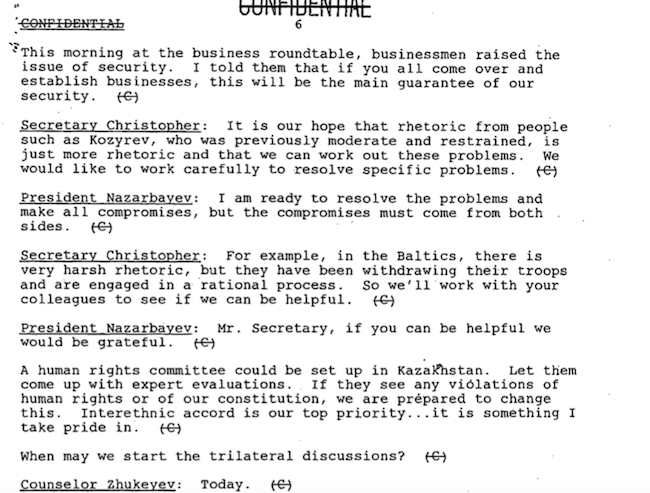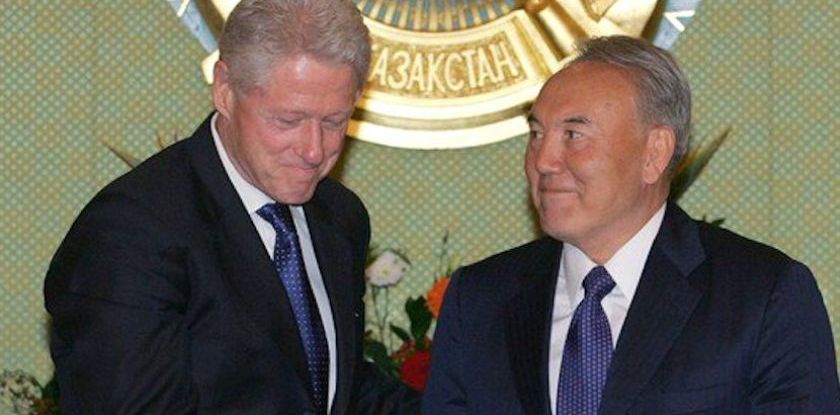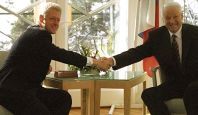This third and final article of the series on Nazarbayev’s 1994 visit to the US based on the declassified reports of the President’s secret negotiations with Bill Clinton is dedicated to the uranium.
Let us remind our reader that the secret diplomatic papers cited in the series have been published by Bill Clinton Presidential Library. It is there where we have found the reports on Nursultan Nazarbayev’s 1994 visit that happened immediately after Kazakhstan had obtained its independence. Since then, the US has had several other presidents and the documents have lost their strategic importance. The Americans publish them for the history (paining over the most sensitive moments, of course). However, to the Kazakhstan reader, these documents still preserve their topicality re both the issues and the persons involved.
As long as there is no war
In 1994, Kazakhstan was living for the future tied to the Caspian oil extraction prospects. Such a future demanded the financial, technological, and geopolitical support that, at that point in time, only the US was able to provide. So, in order to build the strategic relationships with this country, the Kazakhstan authorities were prepared to make a lot of concessions.
For the Americans, however, the Kazakhstan problem was tied not to the future but to the past and came down to the issue of the nuclear nonproliferation. And Kazakhstan had «inherited» all the elements of the nuclear production from the USSR.
The Soviet Union died so quickly that it never got a chance to destroy the fuel reserves that could arm hundreds of warheads. For the US, this threatened to turn into a real geopolitical nightmare. At that point, North Korea, Iran, Pakistan, and the Arab countries were all showing interest in the nuclear technologies. They had their own reasons for hating their neighbors whose safety was guaranteed by the US. Therefore, the escalation of an ordinary local conflict into the global nuclear war was becoming quite feasible a scenario.
The official statement made for the press after the meeting of the two Presidents shows that this scenario occupied the central spot on Bill Clinton’s risks map. The speech started with Clinton’s menacing statement made for the press in the presence of Nursultan Nazarbayev.
«While there are many aspects to the widening relationships between our two nations, the most important is our work in nuclear nonproliferation».
Translating this phrase from the diplomatic into the ordinary language, we can surely interpret it as an ultimatum.
«When the Soviet Union dissolved in 1991, there were four of the new Independent States — Russia, Ukraine, Belarus, and Kazakhstan — who had Soviet strategic nuclear weapons on their territory. One of my highest national security priorities has been to ensure that the breakup of the former Soviet Union did not lead to the creation of new nuclear states».
Then Bill Clinton praised Nazarbayev for agreeing to eliminate the nuclear weapons and promised (in exchange for it) to increase the economic support of Kazakhstan from 85 $ mln to 311 $ mln in 1995. Apart from that, the additional 85 $ mln were to be given for the dismantling of the nuclear arsenal.

Then, the accentuation changed. One of the journalists asked Bill Clinton if the US would block the project of building the direct oil pipeline from Kazakhstan to Iran. It was the most topical issue of the time. Theoretically, Kazakhstan could have eliminated its dependency on the Russian oil transit by selling its uranium reserves for a profit. And the very possibility of the realization of such a scenario was of a great concern for both the US and the Russian strategists.
Clinton took a break allowing Nazarbayev to reply. The President of the Republic of Kazakhstan, as usual, chose to have it both ways. Having pointed out the importance of using the already existing infrastructure (meaning the pipeline delivering oil to Black Sea via Russia), he allowed for the possibility to use the Iranian transit to Persian Gulf. Then, Clinton grabbed the microphone again and specifically underscored that they would first think of using the existing infrastructure.
This was the public side of the matter. But there was the private, unofficial side of it as well. We have learned about it from the declassified reports of the Nazarbayev-Clinton meeting published by Bill Clinton Presidential Library.
Buy the uranium, please!
As we can see from the declassified report, it was Nazarbayev who first spoke of the uranium liquidation. And he did so not for some higher geopolitical reasons but for very practical ones. He complained that the Russians were not going to keep their promises and pay for the enriched uranium taken off the warheads.
Lamenting that Kazakhstan had to carry the financial burden of the operation, Nazarbayev advised the Americans to press this subject when giving the monetary aid to Russia.
But the uranium issue had one more layer. The thing is that Kazakhstan and the US had signed a uranium anti-damping agreement. Then Kazakhstan learned that the US and Russia made the LEU-HEU deal a part of which was delivering the Russian uranium (transformed into fuel) to the US nuclear stations.
This deal, as Nazarbayev complained to his American colleagues, would basically close the access for the Kazakh uranium to the US market. In reply, the Americans just apathetically shrugged their shoulders.
Christopher Warren, the US Secretary of State, reminded Nursultan Nazarbayev that the world was suffocating from the oversupply of the uranium. According to him, «there are 3,000 tons of Russian uranium, 2.700 tons of Kazakh uranium, 2,000 of Western European uranium and 700 tons of U.S. uranium» (estimates for year 1994).
A decrease in world prices threatened the US-Russia agreement which was Clinton’s Administration priority. Kazakhstan was suggested to be patient. What the US was prepared to do at the most was to sign a trilateral agreement with Kazakhstan. This idea, however, was never realized.

Saying ‘yes’ to democracy
At that point in time, Kazakhstan was in desperate need of money and, in his private conversations with Bill Clinton, Nazarbayev was ready to agree to anything. At the meeting, he told how he had personally invited the US entrepreneurs to Kazakhstan to do business which, in his opinion, would be the best insurance of the Kazakhstan safety.
Simultaneously, Nazarbayev expressed his support for the idea to establish a human rights committee in Kazakhstan which was supposed to be an independent agency capable of expertly evaluating the situation in the country. «If they see any violations of human rights or of our constitution, we are prepared to change this», promised the young President of Kazakhstan.
Nazarbayev personally invited Clinton to Kazakhstan, however, it was only Hilary Clinton who had managed to make it there during the time of her husband’s presidency. As for Bill Clinton, he came to Kazakhstan as late as in 2005. And this visit, just like the 1994 meeting in the US, had to do with the uranium.
As we have learned later, in this trip, Bill Clinton was accompanied by Frank Giustra who, in 2005, managed to strike a super-deal — first by buying the Kazakh strategic uranium deposits and then selling them as the shares of a Canadian company. So it appears that, after ten years, Clinton still helped Kazakhstan to «shake off» the uranium travails. Once and for all.





